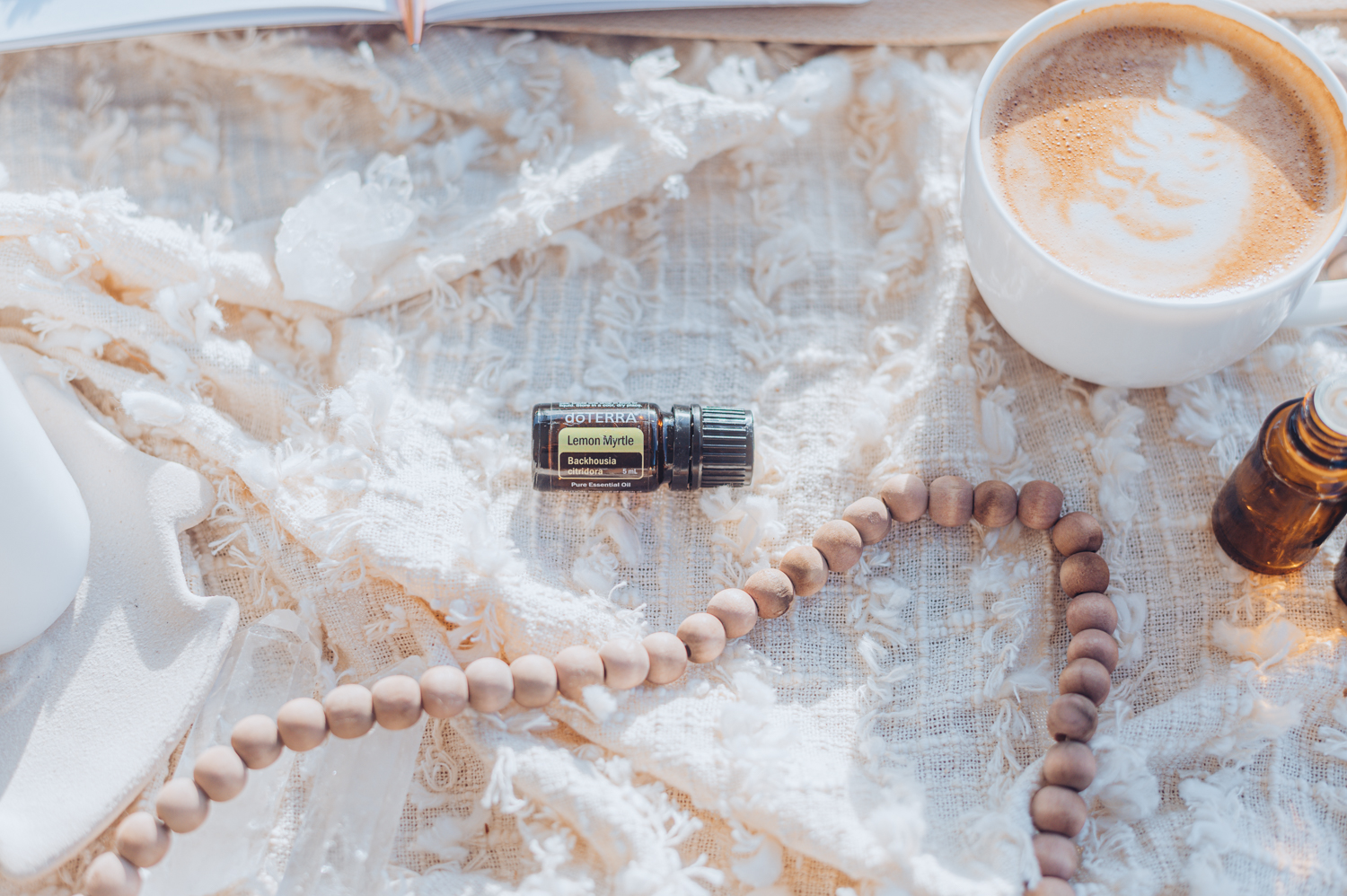
Lemon Myrtle essential oil is distilled from the citrus scented leaves of the subtropical lemon myrtle plant. Native to Australia, Lemon Myrtle has long been used by Aboriginal and Torres Strait Islander people as part of their diet. Lemon Myrtle encourages a sense of calm while creating a feeling of balance. From its name, you may think Lemon Myrtle is just another addition to our wonderful citrus oil collection; however, this essential oil is steam distilled from the leaves of the flowering tree, Backhousia citriodora.
A powerful antioxidant, antimicrobial and anti-fungal with a list of applications to assist with the treatment of throat and skin infections and boost the immune system. Lemon Myrtle essential oil is used as an antiseptic, disinfectant and expectorant and is said to be more powerful than Tea Tree. In aromatherapy, it is valued for its fresh scent with uplifting benefits on your emotions and the ability to soothe, body and mind.
When you open a bottle of Lemon Myrtle, the fresh citrus aroma should immediately remind you of another great essential oil: Lemongrass. Lemon Myrtle and Lemongrass contain many of the same chemical compounds, giving them similar aromatic profiles and supportive benefits. Pure Lemon Myrtle essential oil contains an exceptionally high concentration of citral, the common name given to a naturally occurring mixture of geranial and neral. These two monoterpene aldehydes are geometric isomers, which means that they contain the exact same number of carbon, hydrogen, and oxygen atoms and that their chemical structures are nearly identical. The only structural difference between geranial and neral is the arrangement of the aldehyde group around one of the double bonds.

What Is Lemon Myrtle Good For?
Citral, which is known for its cleansing properties, is the main chemical component in Lemon Myrtle. Use Lemon Myrtle to cleanse the skin or surfaces or purify the air. Always dilute Lemon Myrtle with a carrier oil to minimize skin sensitivity.
Sweet, lemony, and slightly herbal, the aroma of Lemon Myrtle is simultaneously soothing and uplifting to the mood.
Usage Tips:
- For a DIY all-purpose cleaner, add several drops of Lemon Myrtle and Wild Orange to a spray bottle with water and white vinegar.
- Diffuse to help clear and purify the air while supporting feelings of wellbeing.
- Add 1 drop to your facial cleanser or moisturiser for boosted purifying properties and added fragrance.
Benefits of Lemon Myrtle
1. Respiratory Complaints
Studies have confirmed lemon myrtle’s antibacterial and antifungal properties, making it a perfect addition to the diffuser when you’re experiencing a cough or congestion.1 Due to the broad-spectrum antimicrobial activity of Lemon Myrtle, it’s also a great oil to have on hand during cold and flu season.2

2. Concentration & Energy
“The best description I can give for my first impression of Lemon Myrtle is WOW…what a bright happy essential oil. The fresh lemon scent really clears out the cobwebs of the mind…” – Mark Webb.3
How great is this quote from Mark Webb’s book Bush Sense: Australian Essential Oils & Aromatic Compounds. With the popularity of the herb increasing in Australia thanks to its uplifting flavour and aroma, it leaves people feeling happy and vital. When feeling lethargic or in need of some inspiration pop a couple of drops of Lemon Myrtle in your diffuser – it’s a great oil for the workplace or while studying.
3) Uplift the Emotions
As Robbi Zeck states in her book, The Blossoming Heart: Aromatherapy for Healing and Transformation, ”Lemon Myrtle helps you to move away from self-doubt. Driving ourselves unconscious by thinking.”2
Lemon Myrtle is the oil of choice when you need to feel uplifted and rejuvenated. In his book, The Complete Guide To Aromatherapy, author Salvatore Battaglia believes that its psychological properties would be similar to that of the very expensive Lemon Balm Essential Oil.4
Lemon Myrtle helps to alleviate mental fatigue, rejuvenates the mind, helps with stress and is emotionally uplifting.2 It’s recommended to blend Lavender with Lemon Myrtle to help with low mood and with Ylang Ylang and Vetiver to help with feelings of worry and fear.5
4) Fungal Infections
Athlete’s foot or tinea fungal infection usually occurs between the toes and can be relieved by using the DIY Anti-Fungal Blend recipe below. As both Lemon Myrtle and Kunzea have antifungal properties, I find that adding a couple of drops of each to a foot bath can work extremely well to support the healing process, as well as reducing the itch and discomfort.
DIY Anti-Fungal Blend: Add 2-3 drops of Tea Tree, 2-3 drops of Lavender Oil, 2 drops of Lemon Myrtle Oil, to a bucket of warm water. Soak your feet for 10-15 minutes as you sit back and relax.
5) Cleanse and Repel
A gift to the senses, Lemon Myrtle has been found to contain the highest citral purity of all citral containing essential oils, making it a potent insect repellant.
6) Cleaning and the Home
Use of Lemon Myrtle Essential Oil around the home is recommended as it is a natural cleaner, plus gives the benefit of the refreshing aroma of Lemon Myrtle. It’s particularly useful for surface cleaning, especially during cold and flu season, thanks to its antibacterial, anti fungal and germicidal benefits.

In abundance and with hope and blessings
Tracey
XoXo
- Taylor R. Lemon Myrtle the essential oil. CSIRO Rural Research; 1996
- Zeck R. The Blossoming Heart: Aromatherapy for Healing and Transformation. Brolga Publishing; 2004.
- Webb M. Bush Sense: Australian Essential Oils & Aromatic Compounds. M. A. Webb; 2000.
- Battaglia S. The Complete Guide To Aromatherapy. 3rd ed. Black Pepper Creative Pty Ltd; 2018.
- Kerr J. Essential Oil Profile – lemon myrtle. Aromatherapy Today: 2000



